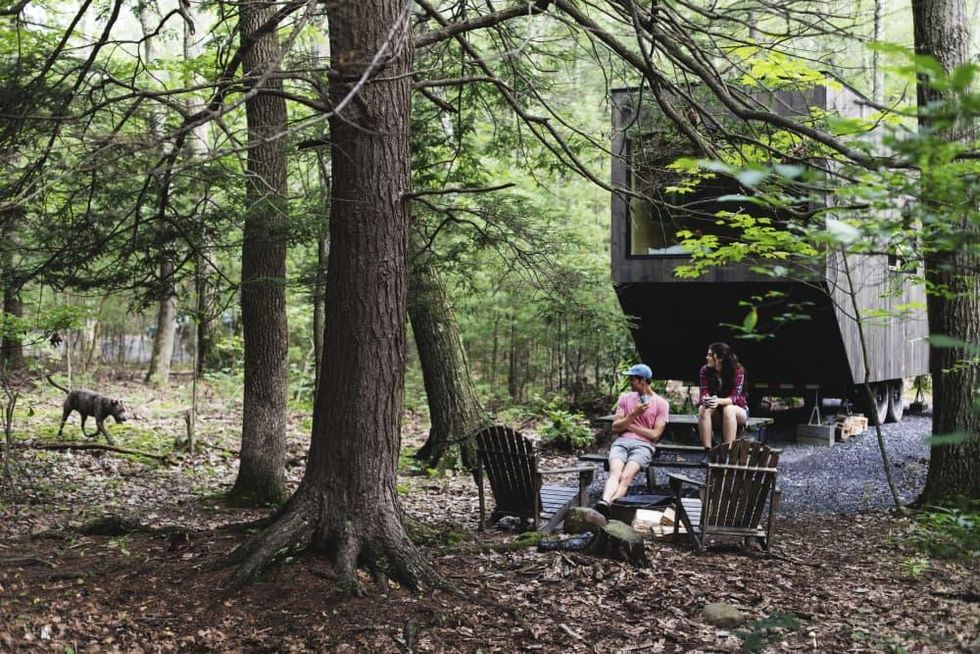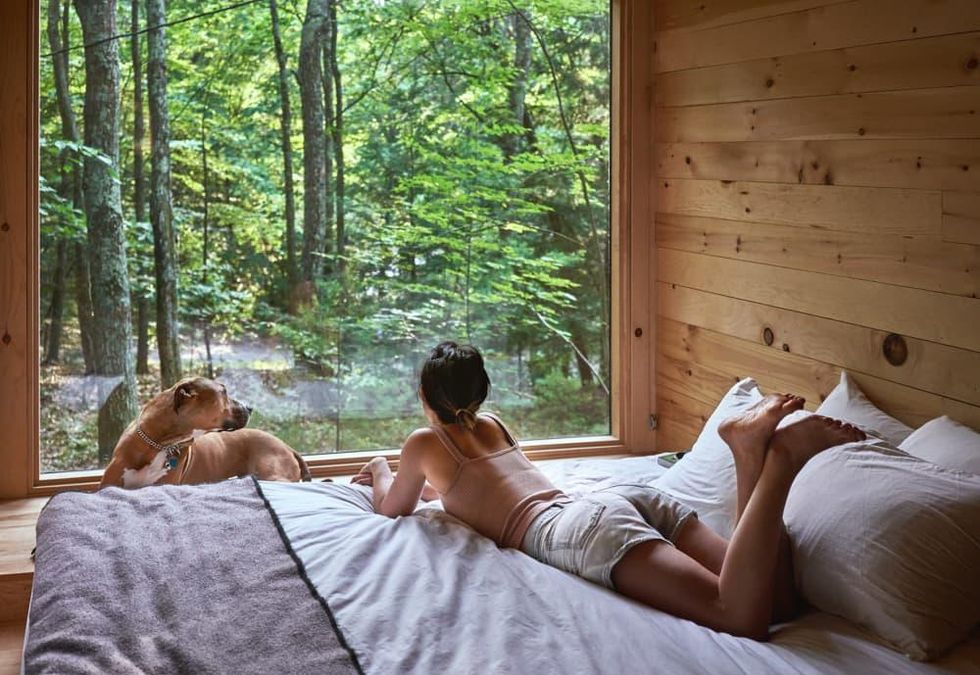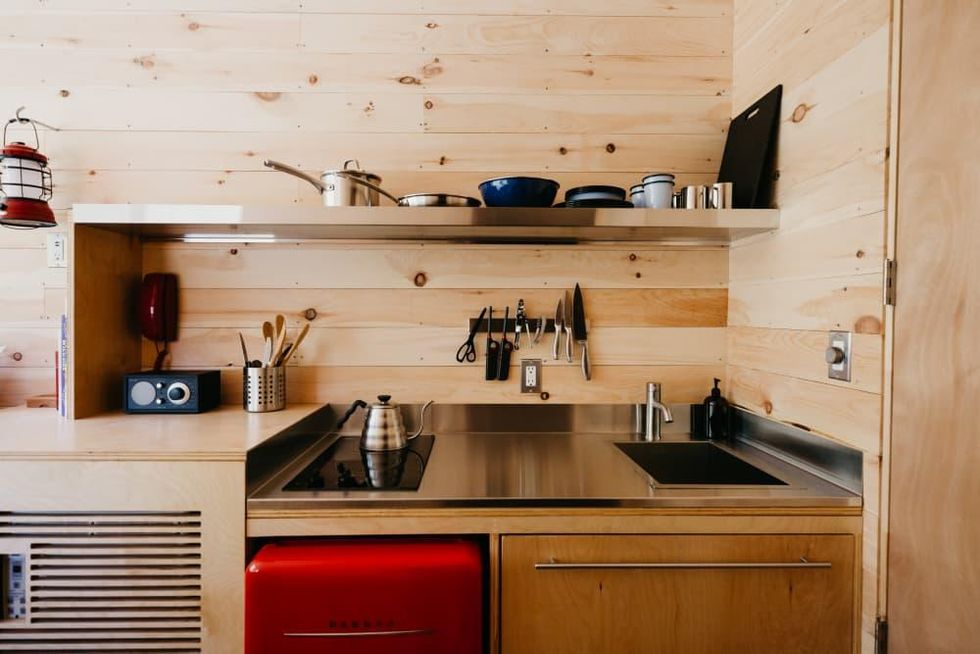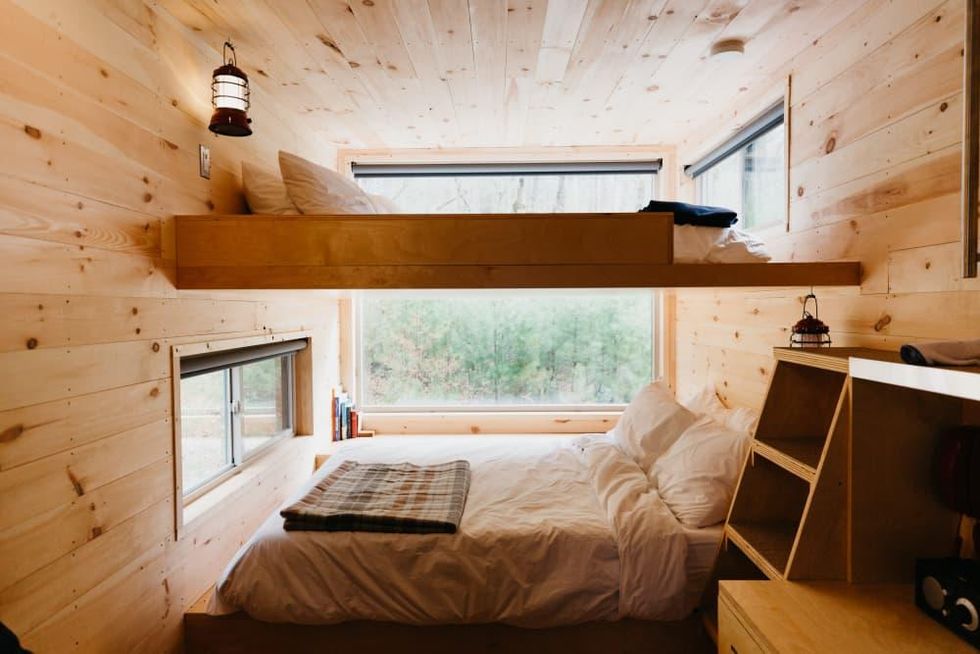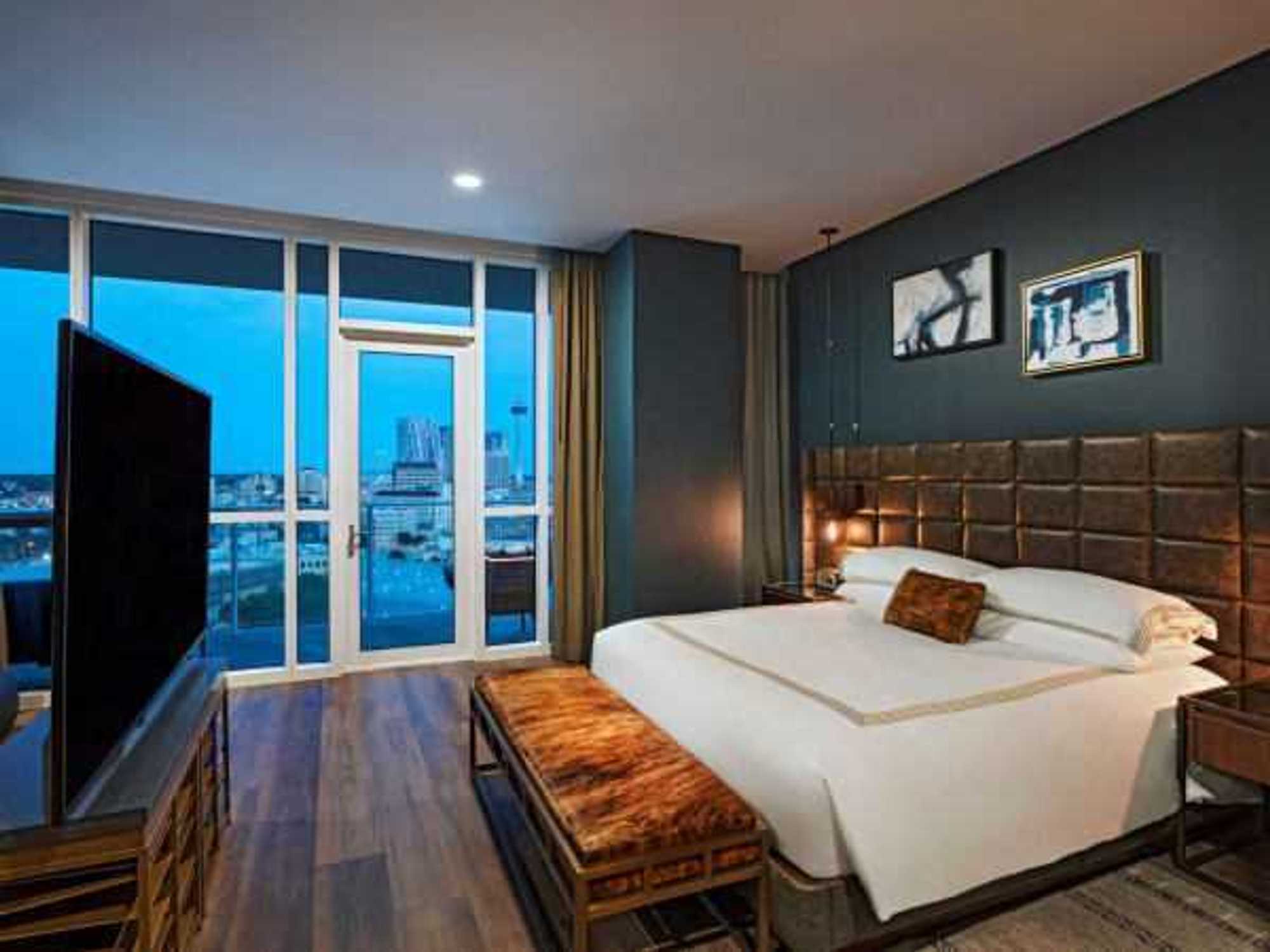in the woods
2 happy campers unplug to recharge at a tiny cabin Getaway in East Texas’ Piney Woods
“It feels like we’re in an REI ad,” my husband said as we crunched over fallen leaves and pine needles toward our chic, black tiny home away from home in the woods.
After a two-hour drive east from our home in Fort Worth, we’d arrived at a 140-square-foot tiny cabin on a Getaway Outpost in the Piney Woods of East Texas.
Getaway Outposts are “resorts” of trendy tiny homes that let city folk like us escape into nature in a slightly upscale way — to turn off digital devices, relax, and recharge our internal batteries — “rustic without having to rough it,” they advertise.
Brooklyn, New York-based Getaway operates some 20 Outposts across the United States, including three in Texas less than two hours out of major cities — “Hill Country” in Wimberley (about an hour from San Antonio); “Brazos Valley” in Navasota (90 minutes from Houston); and “Piney Woods” in Larue (near Athens, two hours from DFW).
Cabins sleep two to four people, they’re pet-friendly, and rates start at $99 per night. Each Outpost has its own charms, but the cabins and site setups are the same at each location. While it’s not unusual to escape to campgrounds, RV parks, or lake houses in nearby areas, three main features set the Getaway Outpost apart:
- Accommodations are comfy, stylish tiny houses with amenities of home (hot shower, flushing toilet, kitchenette, soft bed with high-quality bedding, heat and AC).
- It’s an off-the-grid experience without Wi-Fi or television, and with cellphone lockboxes in each cabin.
- Cabins are at least 150 feet apart, making it possible not to interact with another human being during the stay. Check-in and check-out are even done by text.
This seemed like the perfect “experiment” for a couple like Mike and me — he, an avid “primitive” camper who sleeps soundly in a hammock in the forest, and I, a city princess who prefers to take in nature through organic facials at the spa.
Would a tiny-house Getaway in the woods “feel like camping” enough for him and “not feel like camping” enough for me? We booked two nights and drove to East Texas to find out.
Instagrammy approach
When we arrived just before sunset, warm lights inside the dark cabin made it glow like a home in a glossy real estate spread — or, these days, an Instagram spread. Getaway’s tiny homes — custom designed down to the signature black exterior paint — have become an Instagram sensation, and it’s not hard to see why. They’re like little ink blots of modern architecture dotting natural landscape.
Inside, the teeny, immaculate cabin smelled of fresh Eastern white pine wood. The minimalist design packed a lot in: to the right, a small bathroom with a toilet and shower; to the left, a small table and a queen-size bed beneath a large picture window that offered an unobstructed view out to our own private swath of woods; straight ahead, a kitchenette with a mini Smeg refrigerator, two-burner electric stove, sink, and kitchen essentials like knives and dishes.
The house boasted a surprising amount of storage space — on shelves, hooks, and little cubbies created in smart places, like under the bed. (This was a pleasant discovery for the one of us who brought five pairs of shoes for two days. Ahem.)
Outside, there was nothing around our cabin but a fire pit, two Adirondack chairs, a picnic table, and tall evergreens as far as we could see.
Low-tech entertainment
When the sun set, the true adventure started. At home, nighttime brings mindless TV watching, social media scrolling, internet browsing, and asking Alexa to play sleepy-time music. In the Wi-Fi-free woods, we had to flex some creative muscle worthy of a scouting badge.
We brought a cornhole set from home, strung a lantern to a tree on either side, and threw sacks until it grew too dark to see the targets.
We put on headlamps, borrowed a deck of cards from the cabin, and attempted to play card games at the picnic table. (I say “attempted” because I realized I play so much digital Solitaire on my Kindle, I’d forgotten how to set up the game with real cards.)
Mike split wood like a lumberjack and kept the campfire roaring so I could roast marshmallow fireballs and smash them into s’mores. He assured me that the coyotes we heard howling in the distance would leave us alone and that the shiny diamonds scurrying around on the ground were itsy, bitsy, non-poisonous spiders that weren’t interested in us, either. (Nature at night, eek!)
Back inside by 10 pm, we settled into the cabin, took hot showers, and turned on the heat — which felt gloriously decadent compared to the freezing temperatures outside.
Survival cooking
As on most vacations, one of our main concerns was what, where, and how we’d eat at the tiny cabin. The kitchenette had a stove but no microwave, a minifridge but no ice maker. There was no oven, no toaster, and, no coffee maker — one comfort from home we’d agreed we needed.
Along with our 12-cup Ninja coffee machine and favorite Seattle’s Best blend, we hauled sandwich fixings, packets of instant oatmeal, soup, enough potato chips to feed the whole Outpost, s’mores fixings, and charcuterie. We also packed an ice chest of wine, beer, and water — and left it in the car outside the cabin for easy retrieval. (There’s a no-food-left-outdoors rule because of wildlife like — yikes! — wild boars.)
The Outpost provided little packets of olive oil, salt, and pepper to use for free. So, like pioneers before the dawn of countertop appliances, I griddled breakfast sandwiches on the stove inside, and Mike grilled dinner sandwiches on a cast iron skillet over the fire outside.
Because Outposts are close enough to major roads and towns, some guests don’t bring any of their own food, we had read. But we actually enjoyed figuring out our microwave-free Outpost cuisine. Another survival skill learned!
Beyond the cabin
Because an Outpost is not a traditional campground or RV park, there is no central camp house or ranger station; no activities like canoeing or horseback riding; no store or cantina, not even vending machines.
While we luxuriated in the remoteness and relaxation, we did grow slightly restless and yearn to be more active. We hiked a couple of short walking trails, one of which led to a small pond where you can skip rocks but swimming is prohibited. On a 2-mile walk around the property, we noted interesting bird calls and observed trees and plants we didn’t recognize from home.
We inhaled the piney-fresh air we usually only smelled in Christmas-candle form at home. Speaking of Christmas, as tempting as it was to pick up and pocket pine cones for holiday decorating, Mike reminded me that campers “take nothing but memories, leave nothing but footprints.”
A map of nearby attractions showed several within an hour’s drive: the East Texas Arboretum, Tyler State Park, and a couple of wineries and breweries.
At the Hill Country Getaway Outpost, nearby attractions include Old Baldy Park, Blue Hole Regional Park, and the Driftwood Estate Winery.
In the end, we decided not to break the nature-filled spell, and stayed onsite, enjoying charcuterie and chardonnay by the campfire for hours.
Getting creative with creature comforts
The Getaway site says it supplies “everything you need and nothing you don’t,” which is mostly true — down to the all-important corkscrew for your wine trove.
But we were glad we’d brought a few extra creature comforts from home, including that essential coffee maker. One thing this city princess wish she’d had? A hair dryer. Noted for next time. Yes, we decided there’ll be a next time, especially if we can grab one of the good deals Getaway often posts on social media ($20 off, or spend $300, get $100 free).
Was the Getaway enough of a camping experience for Mike and a non-camping experience for me? We were actually discussing this exact verdict and getting to “yes” as we pulled out of our site, turned on our phones, and — ding! — both lit up with work-related texts and emails. We wanted to turn around and go back immediately.
It was the end of our Getaway. We were fully recharged and so were our devices.
---
Getaway rates start at $99 per night. Find locations and more information at https://getaway.house.

